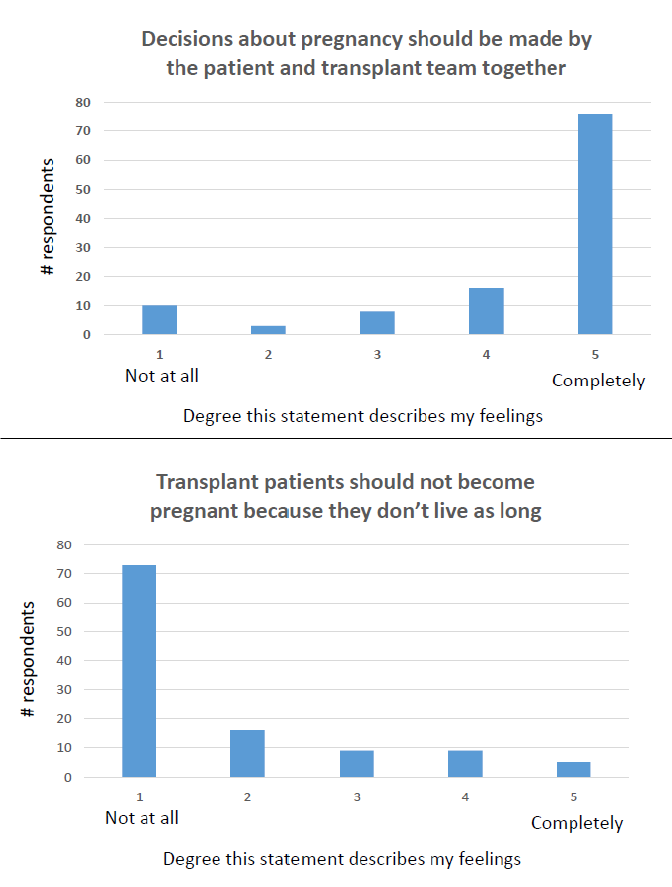Patient Attitudes Regarding Contraception and Pregnancy after Transplantation
P. Puerzer1, T. McIntosh2, C. Sammons3, N. Casciello3, T. Fallah3, M. Norris3, M. Sumit4, J. DuBois5, A. Iltis6, D. Sawinski1
1Univ of Pennsylvania, Philadelphia, PA, 2Washington Univ in St Louis, St Louis, MO, 3Pharmacy, Hospital of the Univ of Pennsylvania, Philadelphia, PA, 4Columbia Univ, New York, NY, 5Washington Univ in St Louis, St. Louis, MO, 6Wake Forest Univ, Winston-Salem, NC
Meeting: 2020 American Transplant Congress
Abstract number: D-067
Keywords: Heart/lung transplantation, Kidney transplantation, Liver transplantation, Pregnancy
Session Information
Session Name: Poster Session D: Kidney Psychosocial
Session Type: Poster Session
Date: Saturday, May 30, 2020
Session Time: 3:15pm-4:00pm
 Presentation Time: 3:30pm-4:00pm
Presentation Time: 3:30pm-4:00pm
Location: Virtual
*Purpose: Professional society recommendations regarding contraception and pregnancy after transplantation exist but little is known about patient attitudes.
*Methods: We conducted a survey of female transplant recipients of reproductive age (18-50 yrs) at our institution; survey items included multiple choice questions regarding contraceptive options and Likert scale assessment of attitudes/concerns surrounding pregnancy after transplantation.
*Results: 115 women completed the survey: 62 kidney, 8 kidney/pancreas, 17 liver, 28 heart, 13 lung and 2 multiorgan recipients. Mean age of participants was 38.8 years (SD 7.9). 46% of participants indicated they currently use contraception, with IUDs (28%) and condoms (22%) as the most common methods. Respondents indicated a preference for the combination estrogen/progesterone pill (18%), IUDs (16%) and condoms (16%), citing pretransplant familiarity, convenience and side effects as the main reasons. Only 49% recalled signing a Mycophenolate REMS and 35% recalled discussing contraception at a posttransplant visit. A majority (72%) were considering pregnancy in the future but only 40% had mentioned it to the transplant team. 22% reported being told they should never become pregnant. Respondents expressed concern that pregnancy might cause rejection (28% extremely concerned; 17% moderately concerned), affect allograft function (27% extremely concerned; 10% moderately concerned) or their longevity (20% extremely concerned; 15% moderately concerned). However, this not universal; 27% were not at all concerned about rejection, 30% not at all concerned about graft loss and 36% not at all concerned about their longevity. Most respondents strongly disagreed that transplant recipients should be advised against pregnancy due to limited maternal longevity (65%), maternal complications (41%), or fetal complications (38%). They expressed a strong preference that pregnancy decision-making should be done jointly by the patient and transplant team (67%).
*Conclusions: Less than half of female transplant recipients of childbearing potential are using contraception. Most are interested in the possibility of pregnancy and do not feel that potential complications from transplantation should be a barrier. Patients want shared decision-making regarding pregnancy with the transplant team.
To cite this abstract in AMA style:
Puerzer P, McIntosh T, Sammons C, Casciello N, Fallah T, Norris M, Sumit M, DuBois J, Iltis A, Sawinski D. Patient Attitudes Regarding Contraception and Pregnancy after Transplantation [abstract]. Am J Transplant. 2020; 20 (suppl 3). https://atcmeetingabstracts.com/abstract/patient-attitudes-regarding-contraception-and-pregnancy-after-transplantation/. Accessed February 14, 2026.« Back to 2020 American Transplant Congress

